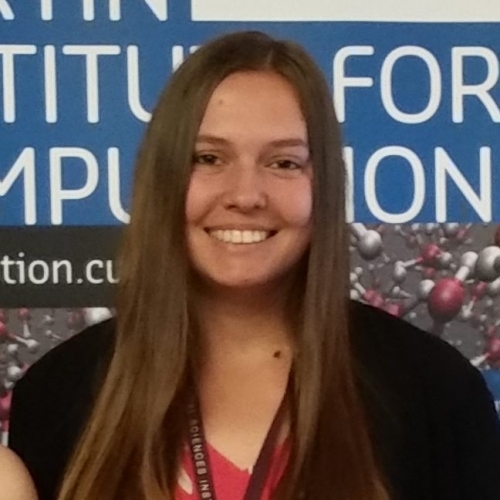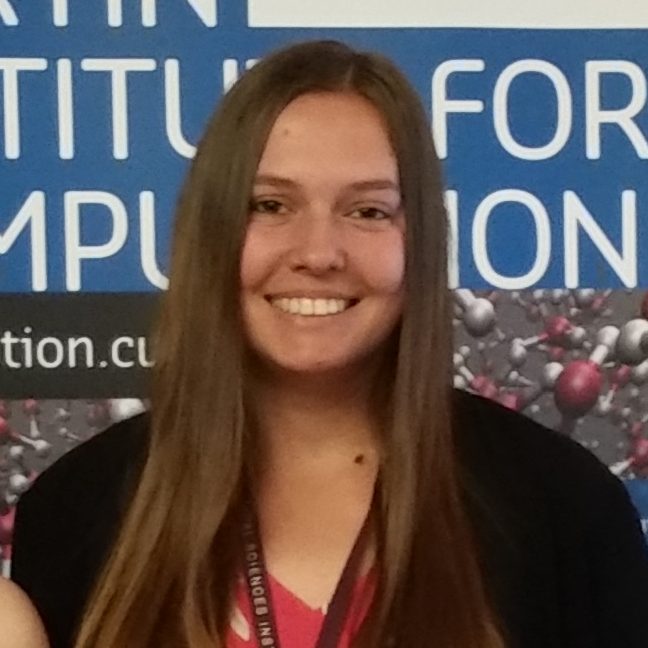
Laura Cartwright
University of Wollongong
I began at the University of Wollongong studying a Bachelor of Medical and Health Sciences, however after one semester I decided I wanted to pursue mathematics and statistics, and so transferred into a Bachelor of Medical Mathematics. Following this, I completed a Bachelor of Mathematics Advanced (Honours) in 2017, in the area of topological data analysis . I am now a PhD student at the University of Wollongong, working in the area of spatio-temporal statistics. I am attempting to improve the computational speed associated with atmospheric transport models, and in turn extend our ability to estimate emission rates and/or locations of certain trace gases from measurements. Outside of university, I spend a lot of time outdoors, especially with my animals!
Can you give me a quick overview of the type of mathematics you are studying and its potential impacts for the broader community
I work in the area of flux inversion, and attempting to find more efficient ways of modelling atmospheric transport of methane and/or carbon dioxide, though my work could be extended to other atmospheric constituents.
Recently I have been attempting to optimise parameters within a relatively simple atmospheric transport model in order to try and improve the fit of predicted methane concentrations to observed methane enhancements (background-corrected concentrations). In optimising these parameters, we are able to obtain more accurate flux estimates.
You attended AMSI Optimise, what drew you to this event? What was the most valuable part of AMSI Optimise for you in terms of furthering your career in mathematical sciences?
Aside from the broad theme of the conference being optimisation, the particular theme for this year appealed to me. My work could be helpful in some greenhouse gas mitigation schemes and so I was drawn towards the opportunity to meet representatives from the gas industry.
I was put in contact with a number of people working close by to the University of Wollongong, who may take interest in my most recent project. This may also see me gain access to another dataset on which I can test my methodology.
The key aim of Optimise is to strengthen research-industry collaboration within this key mathematics innovation space. How effective was this event in stimulating such discussion and opportunities?
I spoke to a number of different people during my time at the AMSI Optimise conference. These people came from many different research areas and backgrounds, and it was interesting to hear different perspectives and ideas which could be applied to my own work. I certainly left the conference with a better idea of what kind of solutions are needed for real problems, and a number of potential ideas to improve my own work.
How important was receiving a CHOOSEMATHS grant in terms of your ability to attend and fully participate in the AMSI Optimise 2019 sessions throughout the week?
This grant was very important to me. I would not have had access to the funds to attend the workshop without receiving this grant. I heard about the AMSI newsletter.
How important are initiatives such as the CHOOSEMATHS Grants in terms of fostering the participation and achievement of women in mathematics, particularly in terms of access to networking opportunities and further training opportunities?
I think these grants are one of many great initiatives currently in place for encouraging women in mathematics. While I believe much of the prejudice against women in mathematics is no longer, initiatives like the CHOOSEMATHS Grants certainly help women to travel, network, and break through in a still male-dominated industry.
In what ways has the experience impacted your maths studies? Has it influenced the direction of your research?
The workshop helped to confirm that the work I am doing is of interest, and well-received by industry, and showed me it is worth continuing my research in this area.
The CHOOSEMATHS Grants are part of a broader program being delivered by AMSI Schools with support from BHP Foundation to turn the tide on Australia’s maths deficit and strengthen maths education and participation of women across the discipline. What do you see as the big challenges facing maths in Australia, particularly for women?
I think the biggest challenge (though I think it is shrinking all the time), is that maths is seen as the “man’s” discipline. I think much of this change needs to come from nurturing young children in a manner which shows no prejudice against women in mathematics and/or statistics. On a broader scale, maths is often seen as “uncool” or “nerdy”, when in reality maths and stats are the future, and are becoming more and more in demand in the workforce. The longer we keep up the stereotypes, the harder it will be to invoke any change. CHOOSEMATHS is a great example of an initiative which is promoting the wider reach of mathematics and statistics. They are showing that these disciplines are not boring, and they are useful in helping to solve almost any problem.
Did you always want to pursue a career in maths? Were you encouraged to study these subjects at school?
No, I have only recently (in the last five years) considered a career in statistics. My family have always been supportive of my academic choices, and I think I was lucky in that respect. I was also lucky to always have fantastic teachers, both at school and university. I transferred into a maths degree after one semester at university and have not looked back since! It was in my third year of my undergraduate degree that the idea of doing my PhD was first suggested to me. Dr. Ken Russell, a wonderful lecturer, mentor, and friend from the University of Wollongong, and whose funeral I sadly attended today, gave me the idea. He always supported me from then onwards, too.
Where do you see yourself in five or ten years time?
I really don’t know. I seem to change my mind about what I’d like to do with my career every few months. Anything form statistical consulting, to staying in academia, to working in industry, and everything in between. I really don’t think I can go too wrong in this day and age, and I’m excited to keep my options open at the moment.
Did you learn about new career options available to you that you were not aware of prior to attending AMSI Optimise?
I learnt that there was a lot more overlap between industry and academia than I originally expected. I was also made aware of a number of additional companies with who I could potentially take on a job. In particular, I realised my skills really were in demand everywhere!
If a peer asked you if they should attend AMSI Optimise, how would you describe the conference to them?
I would say that the conference was well organised (with great food!), and of high quality. It was an excellent networking opportunity, and a good chance to network and learn more about research you may not otherwise be exposed to.

